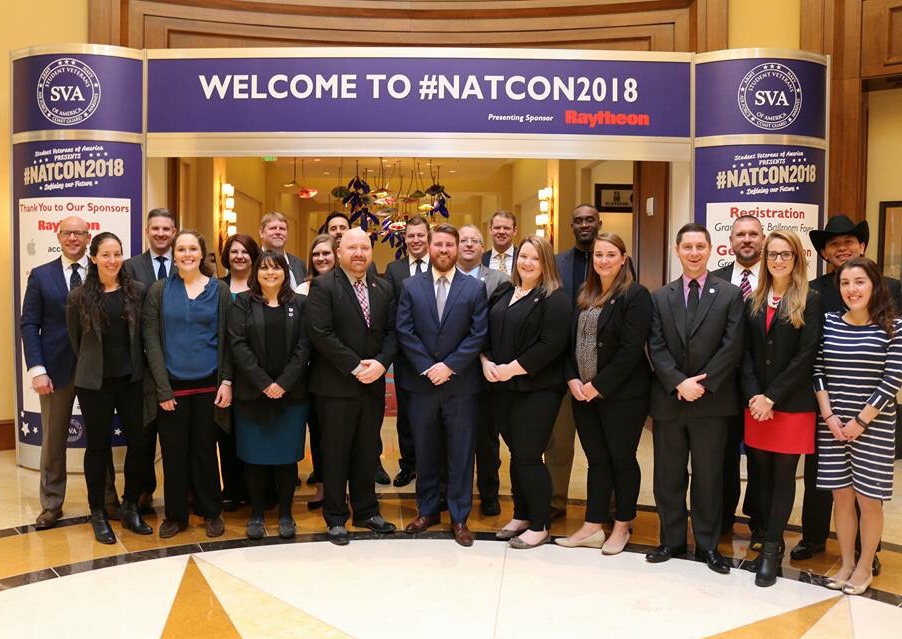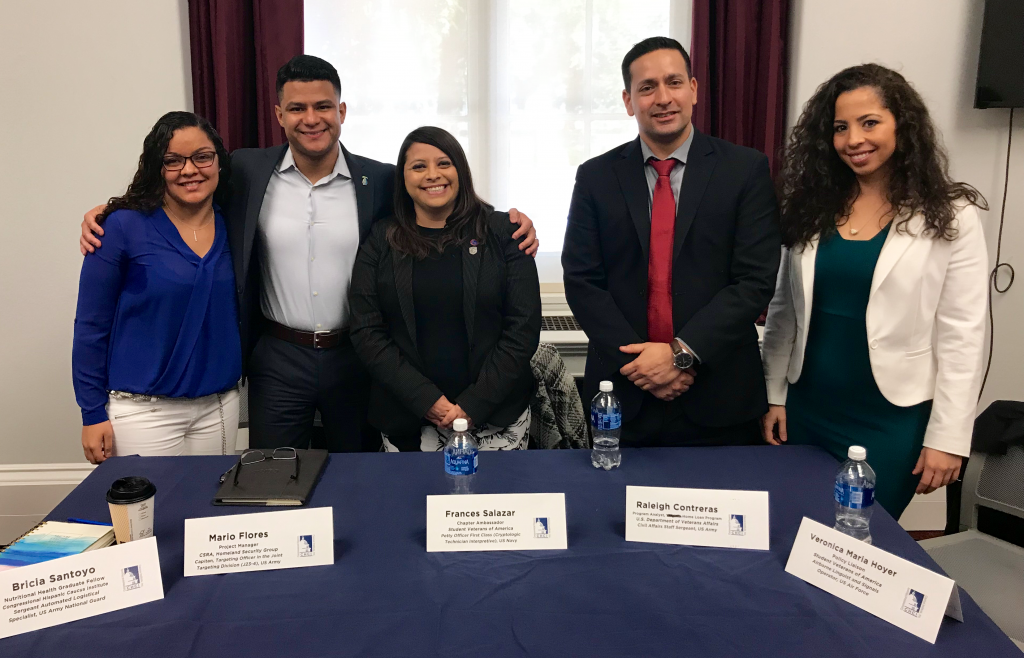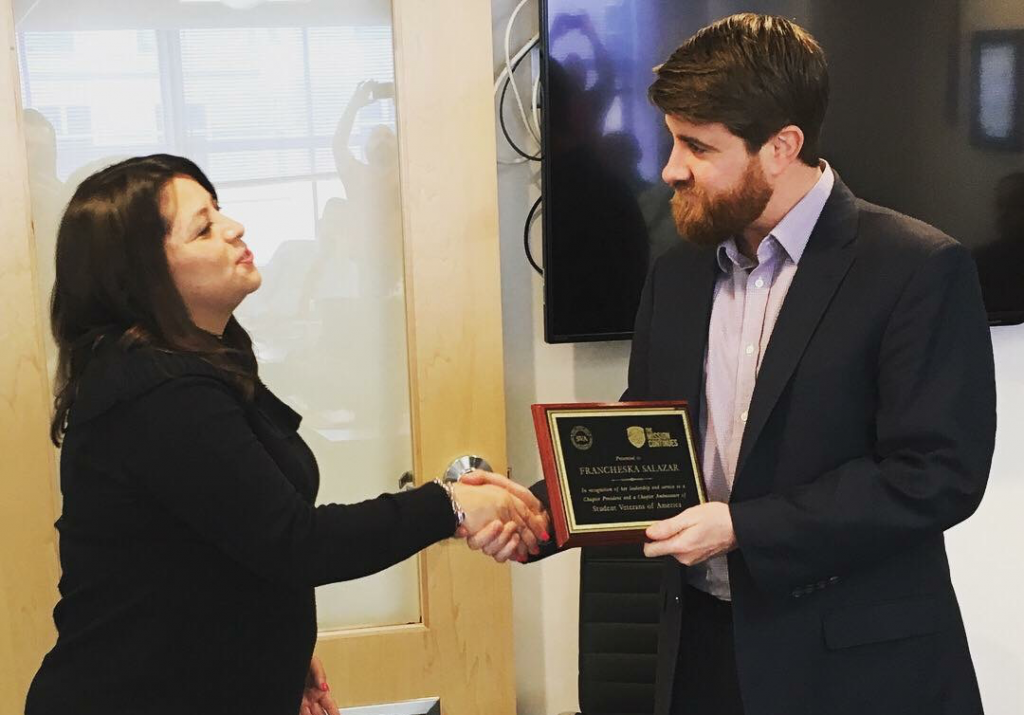
The Mission Continues Fellowship Program, sponsored by the nonprofit organization The Mission Continues (TMC), was founded in 2007 to help post-9/11 veterans serve in their communities while providing strong mentorship throughout the transition into civilian life. It focuses on three goals: service, professional development, and personal growth. Fellowships are available in over 35 major metropolitan areas in the United States. Fellows volunteer 20 hours per week for 26 weeks at a nonprofit organization in his or her community. They set goals with the host organization to achieve maximum impact. In addition to personal mentorship, the fellowship provides a monthly stipend.
We spoke with recent Mission Continues Fellow Francheska Salazar to learn about her experience as a fellow in Washington, D.C. and her suggestions for creating a successful application to the program.
1. What inspired you to apply for the Mission Continues Fellowship?
As a Navy veteran and full-time student, my passion to serve, as it is for most veterans, did not stop when I left active duty. While transitioning from Sailor to civilian, I discovered that many of my struggles were not unique. As my campus Student Veterans of America (SVA) Chapter President, I heard similar stories of challenges faced on the path to higher education. I realized I had a strong passion for advocating, and I changed my major from medicine to law.
I had no idea where to start in my new major, so I began researching fellowships that would let me serve the military and veteran community. This is when I discovered a once in a lifetime opportunity – The Mission Continues Fellowship. For my fellowship, I worked as a Chapter Ambassador for SVA Headquarters in Washington, D.C. for six months. The experiences, mentorship, and lasting relationships built in D.C., and nation-wide, have been truly life-changing. I learned about advocating and grew both professionally and personally by leaps and bounds. I am truly forever grateful to both The Mission Continues and SVA for the difference they made in my life.

2. What are the benefits of the fellowship?
The Mission Continues focuses on connecting veterans with other non-profit organizations that pique their interest of the fellow. Some veterans choose to work with organizations that assist the homeless, organize mentorship programs for children, or help solve environmental issues. The fellowship is as diverse as the veteran population and provides a stipend for 80 hours per month. Fellows must contact their TMC mentors bi-monthly, complete monthly assignments, and submit monthly timesheets along with at least two photos of fellowship activities.
My fellowship never felt like work. I had the great fortune of learning about veteran advocacy, mentoring student veterans, and empowering student veteran leadership across the country. SVA Chapter Support is responsible for mentoring 1500 SVA Chapters nationwide. Not only did I connect with fellow student veterans, but also I had the opportunity to develop a seminar to help SVA chapters connect to their Student Government Association (SGA). This happened at the largest gathering of student veterans in the country, the SVA’s National Conference (NATCON18) in San Antonio, Texas. In addition, I represented SVA at the first Maryland Veterans Summit, where 125 Veterans Service Organizations gathered to discuss veteran and military issues to find resolutions. While I am thankful to have been selected to participate in such monumental events, the best part of my fellowship was having incredibly patient and knowledgeable mentors throughout my personal and professional development.

3. What tips would you give others applying to the Mission Continues Fellowship?
The application process occurred over a month or two. First, you must complete the application and supply the requested documentation. If someone is selected for the first stage, TMC contacts the potential candidate for a phone interview. The candidate then selects a host site from the list provided by TMC. If the host site has availability, the candidate schedules another interview. Once the host site accepts the candidate, TMC requires the candidate and the host site to develop a Memorandum of Understanding (MOU), which establishes the fellow’s role and measurable goals. The Mission Continues wants to ensure that the host site develops the fellow’s potential. Once this process has been completed, the fellow attends orientation for free for a weekend of training and learning more about the organization. At orientation, fellows meet one another and their mentors who will provide professional development and guidance over the next six months.
The Mission Continues looks for dedicated, committed, and forward-thinking candidates who want to make a difference in their communities. Fellows must be adaptable, amiable, and willing to step out of their comfort zone to learn about the fellowship, the host site organization, and themselves. The most common and distinctive character trait among fellows has to be their passion for their organization’s mission and that they all want to make a difference in their communities. Fellows want to pay forward the kindness they have received by empowering others to make this world better than they found it.
Francheska Salazar was in the Navy for 13 years and worked as a translator for medical teams on humanitarian missions during a 3-year deployment. She is a Mission Continues Fellowship alum (2017-2018) and is a Veterans of Foreign Wars & Student Veterans of America Legislative Fellow (2017-2018). In addition, she is a student at a smaller community college and plans to pursue a career as an attorney in the future.
© Victoria Johnson 2018, all rights reserved